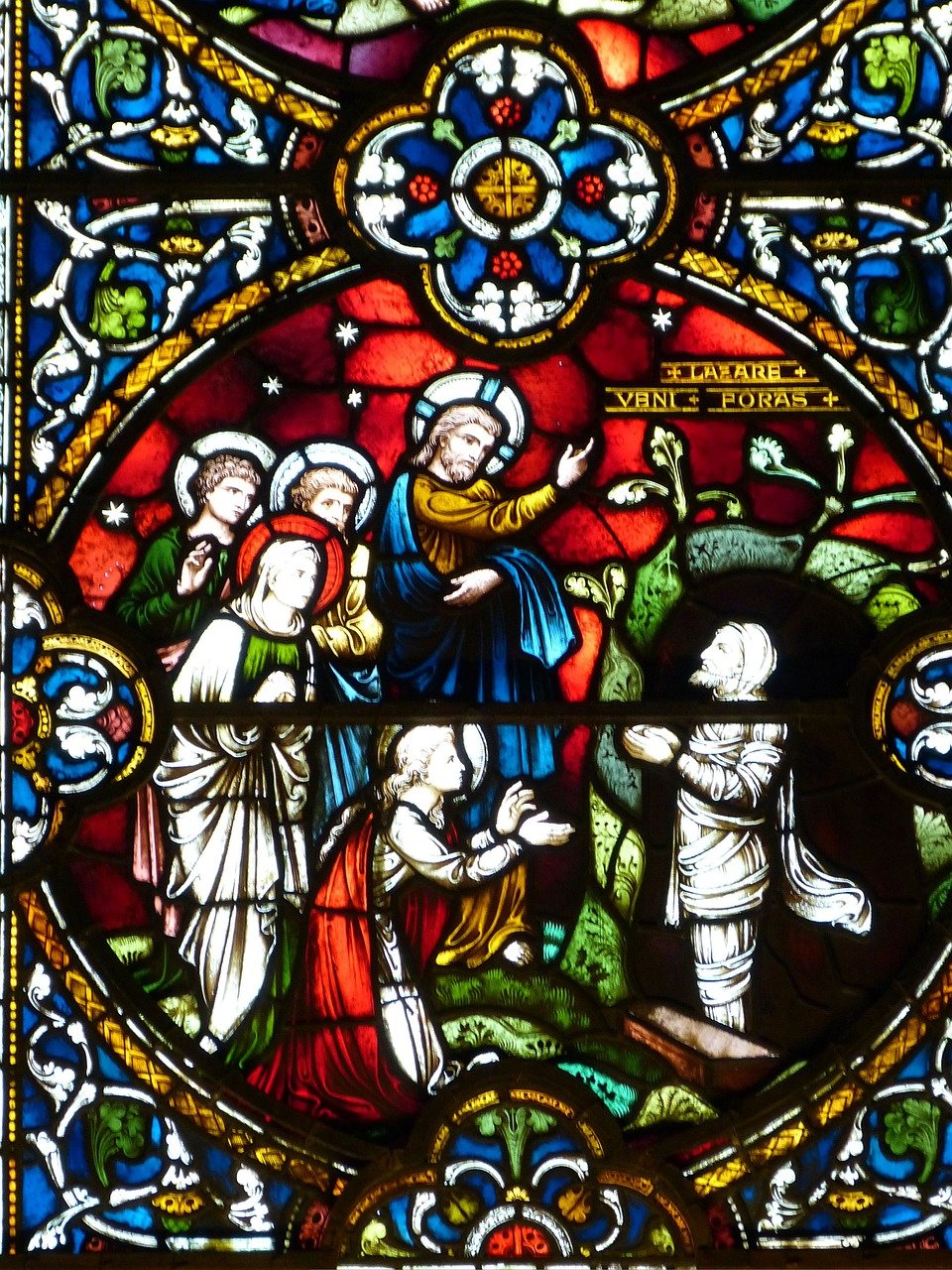In John 11, the apostle John records a miraculous event that the synoptic gospels choose to omit. Jesus’ friend Lazarus has gotten sick and
is about to die, so He and the apostles are on their way to visit him. Jesus is informed by messengers that Lazarus is ill, and his two sisters are seeking his help. Jesus tells his followers that he intends to wait for Lazarus to die, in order that God may be glorified:
is about to die, so He and the apostles are on their way to visit him. Jesus is informed by messengers that Lazarus is ill, and his two sisters are seeking his help. Jesus tells his followers that he intends to wait for Lazarus to die, in order that God may be glorified:
“This sickness will not end in death. No, it is for God’s glory so that God’s Son may be glorified through it.” (verse 4) Jesus then delays for two days (verse 6). The disciples are afraid of returning to Judea (verse 8), but Jesus commands them to go with him, stating: “Lazarus is dead, and for your sake I am glad I was not there, so that you may believe.” (verses 14-15) When they arrive in Bethany, they had found out that Lazarus had kicked the bucket 4 days prior to their arrival (verse 17). Lazarus’ sister Martha comes out to meet with Jesus (verse 20) and tells Him “if you had been here, my brother would not have died”. (verse 21) Jesus comforts Martha by telling her that her brother will rise from the dead, saying
“I am the resurrection and the life. He who believes in me will live, even though he dies; and whoever lives and believes in me will never die. Do you believe this?” Martha responds “Yes, Lord. I believe that you are the Messiah, the Son of God, who is to come into the
world” (verses 22-25) Then later in the chapter, John describes the raising of Lazarus from the dead. They move the stone of the tomb back and Jesus shouts “Lazarus! Come forth!” and Lazarus comes out of the tomb.
world” (verses 22-25) Then later in the chapter, John describes the raising of Lazarus from the dead. They move the stone of the tomb back and Jesus shouts “Lazarus! Come forth!” and Lazarus comes out of the tomb.
This incident has unfortunately been used to erroneous theological views. Here are several false teachings people use the Lazarus passage to
support, and why I don’t think this event does not establish any of them.
support, and why I don’t think this event does not establish any of them.
*It Does Not Prove Calvinism/Monergism
Calvinists love pointing to the Lazarus passage to support their view that we don’t have a choice in whether or not we choose to accept
Christ as our Lord and Savior. Calvinists believe that we’re “dead in sin” and cannot respond to God apart from God’s grace. I agree with that, but Calvinists take it a step further and argue that prevenient grace or resistible grace is not sufficient to get people to turn to God. God must extend an irresistible grace in order to get people to turn.
Christ as our Lord and Savior. Calvinists believe that we’re “dead in sin” and cannot respond to God apart from God’s grace. I agree with that, but Calvinists take it a step further and argue that prevenient grace or resistible grace is not sufficient to get people to turn to God. God must extend an irresistible grace in order to get people to turn.
They’ll point to the Lazarus passage and point to the fact that Lazarus was physically dead. Lazarus was physically dead and did not have a
choice as to whether he would be resurrected. Jesus unilaterally brought Lazarus back to physical life. Jesus didn’t ask Lazarus “Hey, do you want to
live again?” and then resurrected Lazarus based on his response. Rather, Jesus simply chose to bring Lazarus back to life apart from any free choice on the part of Lazarus. So if Lazarus couldn’t freely choose to come to physical life, how could we choose to come to spiritual life? After all, a dead man can’t believe. A dead man can’t choose!
choice as to whether he would be resurrected. Jesus unilaterally brought Lazarus back to physical life. Jesus didn’t ask Lazarus “Hey, do you want to
live again?” and then resurrected Lazarus based on his response. Rather, Jesus simply chose to bring Lazarus back to life apart from any free choice on the part of Lazarus. So if Lazarus couldn’t freely choose to come to physical life, how could we choose to come to spiritual life? After all, a dead man can’t believe. A dead man can’t choose!
Yeah, a dead man can’t believe. A dead man can’t choose. Guess what else? A dead man can’t sin either. A dead man can’t murder. A dead
man can’t commit blasphemy. A dead man can’t commit adultery. All that a dead man can do is…nothing. Here’s the thing; spiritually dead people are physically alive! They have functioning cognitive faculties. They can think, walk, talk, and do a whole host of other things physically dead men cannot.
man can’t commit blasphemy. A dead man can’t commit adultery. All that a dead man can do is…nothing. Here’s the thing; spiritually dead people are physically alive! They have functioning cognitive faculties. They can think, walk, talk, and do a whole host of other things physically dead men cannot.
This is what happens when you push biblical metaphors too far. Unbelievers, though spiritually dead, are nevertheless physically alive.
Lazarus wasn’t given the option to be resurrected, but it doesn’t follow that people cannot choose to receive The Holy Spirit and ask Him to make them born again. Provided that God extends prevenient/resistible grace to a person, they can either choose to resist that grace until the day they die (Acts 7:51, Romans 1:18-20), or stop resisting and be born again (John 3:3, 2 Corinthians 5:17). In fact, I hold that if one does not resist God’s grace, regeneration would be inevitable. God’s grace is like a river. You will be swept away unless you swim against the stream. Of course, even if you swim against the stream, you might get worn down and thus give up swimming against the current, and so get swept downstream as a result.
Lazarus wasn’t given the option to be resurrected, but it doesn’t follow that people cannot choose to receive The Holy Spirit and ask Him to make them born again. Provided that God extends prevenient/resistible grace to a person, they can either choose to resist that grace until the day they die (Acts 7:51, Romans 1:18-20), or stop resisting and be born again (John 3:3, 2 Corinthians 5:17). In fact, I hold that if one does not resist God’s grace, regeneration would be inevitable. God’s grace is like a river. You will be swept away unless you swim against the stream. Of course, even if you swim against the stream, you might get worn down and thus give up swimming against the current, and so get swept downstream as a result.
The thing is, as long as God extends resistible grace, a man, though he be spiritually dead, nevertheless is able to choose to be spiritually alive…by placing his trust in Jesus Christ.
Moreover, being spiritually dead doesn’t entail any inability to act. Rather, spiritual death is separation from God. The Calvinist conflates
the nature of physical death with the nature of spiritual death. The Calvinist is defining spiritual death as a corpse with no spirit, like Lazarus was before Jesus raised him from the dead. But a spiritually dead person is not the same as a physically dead one as I have already pointed out. Before God’s grace is poured out onto a non-believer, he does not search for God, but he is still physically alive and is still able to make choices. After God begins to draw the non-believer through His grace, then the non-believer is enabled to
believe.
the nature of physical death with the nature of spiritual death. The Calvinist is defining spiritual death as a corpse with no spirit, like Lazarus was before Jesus raised him from the dead. But a spiritually dead person is not the same as a physically dead one as I have already pointed out. Before God’s grace is poured out onto a non-believer, he does not search for God, but he is still physically alive and is still able to make choices. After God begins to draw the non-believer through His grace, then the non-believer is enabled to
believe.
The first time this type of death or separation ever took place was in the Garden Of Eden, right after Adam and Eve took the forbidden fruit and ate of it. When they took the fruit from the tree of the knowledge of good and evil, and ate it, they did not instantly die in the physical sense, but they were immediately separated from God. The first thing they did was make ugly clothes out of fig leaves to cover their naughty bits in a fruitless effort
to hide from God (Genesis 3:8).
to hide from God (Genesis 3:8).
Speaking of non-believers, the Apostle Paul describes spiritual death in Ephesians 4:18-19:
“They are darkened in their understanding and separated from the life of God because of the ignorance that is in them due to the
hardening of their hearts. Having lost all sensitivity, they have given themselves over to sensuality so as to indulge in every kind of impurity, and they are full of greed.”
hardening of their hearts. Having lost all sensitivity, they have given themselves over to sensuality so as to indulge in every kind of impurity, and they are full of greed.”
I want you to see that in this passage the non-believer is not an inanimate corpse devoid of the ability to make choices. Non-believers
are “darkened in their understanding and separated from the life of God
because of the ignorance that is in them due to the hardening of their hearts.”
are “darkened in their understanding and separated from the life of God
because of the ignorance that is in them due to the hardening of their hearts.”
Jesus also describes death this way twice in the parable of the Prodigal son (Luke 15). Speaking to the servants the father says “this son of mine was dead and is alive again; he was lost and is found.” To his older son the father says “we had to celebrate and be glad, because
this brother of yours was dead and is alive again; he was lost and is found.”
this brother of yours was dead and is alive again; he was lost and is found.”
In The Parable Of The Prodigal Son, the son was clearly not incapable of making decisions. He was nothing like Lazarus was when Lazarus was
lying in the tomb for 4 days. The Prodigal son was clearly able to make decisions, including the decision to go home. Yet, the father still described
his state of being prior to coming back as “dead”! That’s because the son was separated relationally from his father, and was dependent on the
generosity of his father in order to be reconciled. The same is true of us in our spiritual death and separation from our Father.
lying in the tomb for 4 days. The Prodigal son was clearly able to make decisions, including the decision to go home. Yet, the father still described
his state of being prior to coming back as “dead”! That’s because the son was separated relationally from his father, and was dependent on the
generosity of his father in order to be reconciled. The same is true of us in our spiritual death and separation from our Father.
In conclusion, the Lazarus story in no way supports the Calvinist’s view that men are incapable of choosing Christ. Calvinist’s are
right in asserting that in the absence of grace, everyone would make a vote against God. After all, Jesus made it clear in John 6:44 and John 6:65 that no one would ever come to Him unless the Father drew them. Neverhtless, they are incorrect in asserting we are absolutely incapable in the same way a corpse is incapable. Spiritual death and physical death are similar, but they have their differences.
right in asserting that in the absence of grace, everyone would make a vote against God. After all, Jesus made it clear in John 6:44 and John 6:65 that no one would ever come to Him unless the Father drew them. Neverhtless, they are incorrect in asserting we are absolutely incapable in the same way a corpse is incapable. Spiritual death and physical death are similar, but they have their differences.
* It Doesn’t Prove Soul
Sleep
Sleep
Believers in soul sleep, like the Christadelphians and Jehova’s Witnesses, appeal to the Lazarus passage to argue for soul sleep. They’ll point to such factors as that Jesus said “Lazarus is asleep” and that Lazarus appears to have no recollections of being in Heaven for the last 4 days. I heard one speaker say “You’d expect him to be complaining about having to come back to this Earthly life if he had been in Heaven for the last 4 days”.
The problem with these arguments is that they’re mostly arguments from silence. Just because John does not record Lazarus talking about his near death experience does not mean that he didn’t have one. In fact, John doesn’t record anything that Lazarus said upon exiting the tomb. Not “Huh?” or “What’s going on, guys?” or “Why am I wrapped up like this?” or anything. John doesn’t record Lazarus as saying anything much less a near death experience recollection.
The problem with these arguments is that they’re mostly arguments from silence. Just because John does not record Lazarus talking about his near death experience does not mean that he didn’t have one. In fact, John doesn’t record anything that Lazarus said upon exiting the tomb. Not “Huh?” or “What’s going on, guys?” or “Why am I wrapped up like this?” or anything. John doesn’t record Lazarus as saying anything much less a near death experience recollection.
Besides, the fact that John 11:11 says “Our friend Lazarus has fallen asleep; but I am going
there to wake him up.” Doesn’t necessarily mean that Lazarus’ soul was in a sleep like state prior to his raising. It’s very plausible to think that all of the times The Bible describes dead people as being “asleep”, it’s merely a euphemism or a metaphor. After all, the physical postures of being asleep and being dead are the same (i.e you’re lying down). Likewise, the physical posture of waking up and being resurrected are the same (i.e you sit up and get up). So it makes sense to refer to death as “sleep” and being resurrected as being awakened. It’s eisegesis to take verses like “we who are asleep in Christ” and “Lazarus is asleep” and others like it and build doctrine on that.
there to wake him up.” Doesn’t necessarily mean that Lazarus’ soul was in a sleep like state prior to his raising. It’s very plausible to think that all of the times The Bible describes dead people as being “asleep”, it’s merely a euphemism or a metaphor. After all, the physical postures of being asleep and being dead are the same (i.e you’re lying down). Likewise, the physical posture of waking up and being resurrected are the same (i.e you sit up and get up). So it makes sense to refer to death as “sleep” and being resurrected as being awakened. It’s eisegesis to take verses like “we who are asleep in Christ” and “Lazarus is asleep” and others like it and build doctrine on that.
The interpretation is all the more plausible when read in light of the passages that clearly support a disembodied intermediate afterlife prior to the bodily resurrection (e.g Luke 23:43, 2 Corinthians 5:8).
Discover more from Cerebral Faith
Subscribe to get the latest posts sent to your email.




